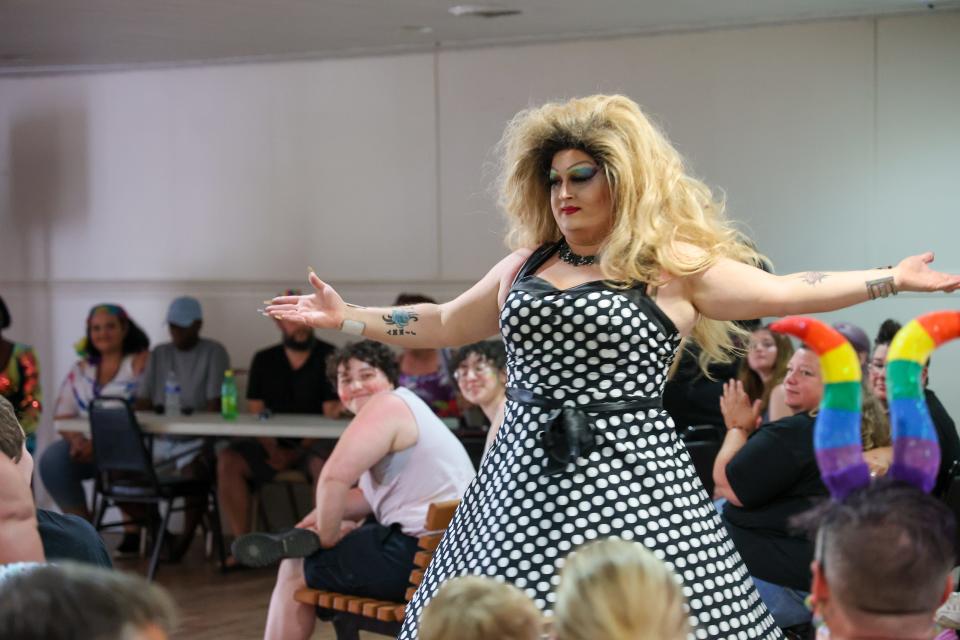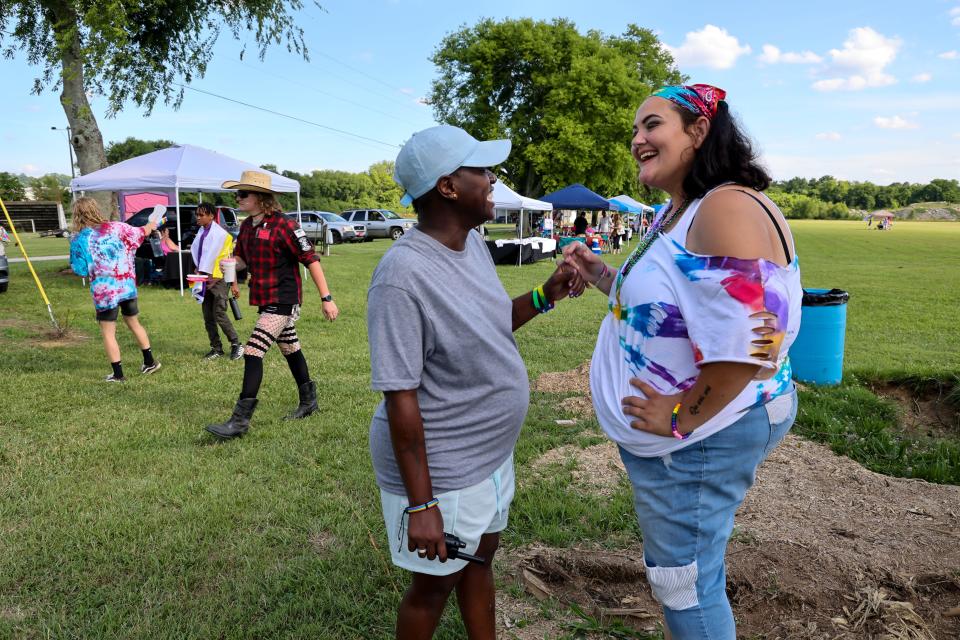Rural Tennessee county jumps into drag show debate with new park rules
As state lawmakers debate how to regulate drag shows, a rural Tennessee county has jumped into the fray with its own set of rules.
The Giles County Agri-Park Board Committee on Jan. 13 passed a number of new bylaws and regulations for the county’s Agri-Park. Tucked between the rules regarding fireworks, grilling and park hours was a ban on adult entertainment as well as “male or female impersonators” from the park.
There are no state laws yet banning drag performances in public places, but the county's rule change comes as a bill to change that works its way through the state legislature.
County Commissioner and Committee Chair Matt Rubelsky told The Tennessean the night before the meeting that there would be “no vote on Friday (or any day) ‘regarding adult cabaret in public spaces.'”
Less than 24 hours later, the ban against "male or female impersonators" was voted on and passed.
Rubelsky told The Tennessean the new regulations are part of an “ongoing effort to revisit and revise” policies for the park and to prohibit anything that could “have bearing on the health, safety, welfare, and morals of our community.”

The rule echoes efforts at the state level. SB 03, which passed in the state Senate on Thursday, seeks to expand obscenity by adding language describing “adult cabaret performance,” which includes performances “in a location other than an adult cabaret that features topless dancers, go-go dancers, exotic dancers, strippers, male or female impersonators who provide entertainment that appeals to a prurient interest."
The bill goes before the House Criminal Justice Committee on Tuesday. If it passes and takes effect, performers found in violation could be charged with a misdemeanor, with the second offense being a felony.
Stella Yarbrough, the legal director of the ACLU of Tennessee, said the new Giles County parks rules pose "very significant First Amendment concerns."
Pride events in rural America:'Rednecks 4 Rainbows': Surge in small-town Pride events helps LGBTQ folks find home. Is it enough?
What is drag? As performances draw political criticism, experts weigh in
"But taking a step back, it's more than even First Amendment — like so many of these laws or rules, it is ultimately aimed at the public eraser of LGBTQ people from the public eye," Yarbrough said. "That's why they're targeting events that they know are family events — like pride events — that are meant for entire communities and are not adult entertainment anyway."
‘It’s not the right place,’ Rubelsky says
According to the new park rules in Giles County, “Nudity, live performances which involve the removal of clothing or garments, performances of male or female impersonators, the performance or simulation of sexual or indecent acts, public indecency, and the display, distribution or sale of sexually oriented materials or pornography are prohibited.”

During the January meeting, committee member and former Pulaski Mayor Patrick Ford expressed concern over the “defensibility” of the rule, as well as previous womanless beauty pageants — or comedic pageants where men dress as women — that had occurred on the property.
County Attorney Chris Williams said the rules could withstand legal muster and said he would “defend it” if pushback occurred. Ford later voted for the new rules.
Rubelsky said the new rule was to keep the park a “family friendly environment,” and that it was “not the right place” for male or female impersonators.
“If you look at ultimately what our Ag-Park is, our Ag-Park is an educational center for our youth and for adults,” he said. “And we want to make sure it’s a good environment for not only our adults but for our children."

Rubelsky disagreed there were any First Amendment concerns with the new rule.
In an email, County Executive Graham Stowe called questions about the rule a “cherry-picked distortion.” He said the committee did not "vote to ban male or female impersonators,” despite the rule explicitly listing “male or female impersonators,” in addition to a number of adult-oriented performances, as being “prohibited.”
“They voted to institute a comprehensive park policy that regulates a number of issues, from fireworks to campfires, from 'bounce-houses' to adult-oriented entertainment,” he said, noting that the two previous Pride events that included drag shows were part of discussions leading up to the rule change.
Stowe called First Amendment concerns “misperceptions,” and were “unfounded.” He said the bulk of the committee's four months of work had nothing to do with "adult-oriented entertainment."
'It's disturbing,' says civil rights attorney
Rules that could ban drag performances within the Giles County Agri-Park is "outrageous and discriminatory," according to Maureen Holland, a civil rights and employment attorney in Memphis, who currently serves as the section chair of the LGBT Section of the Tennessee Bar Association.
"It's disturbing," she said. "This rule — along with the bill that just passed the Senate — is designed and intended to discriminate against the LGBTQ community. Not just individuals who engage in drag shows, but also individuals who are transgender and or non-binary. And this essentially criminalizes cross-dressing as well."
Holland, who was one of the attorneys on the Obergefell v. Hodges case that gave equal marriage rights to same-sex couples, says the rule change, along with the state bill, are just micro-examples of a larger movement against LGBTQ rights across Tennessee.
More:Giles County to remove Confederate memorabilia from jury deliberation room after appeal
Senate debate:Tennessee Senate passes bill on 'male and female impersonators' amid drag show debate
"We have art that is accepted that affects minors: cheerleading, for example," she said. "Where individuals are dressed in limited clothing and they dance — and there seems to be no effort to stop cheerleading, whether it's in television or at sporting events. So it's really not about protecting minors. This law seems to be specifically designed to harm the LGBTQ community."
Holland stated there was little doubt that the Giles County rule posed deep First Amendment concerns.
"It appears, from my perspective, that these laws violate the First Amendment because they are infringing upon symbolic speech," she said.
Yarbrough said the attempt to categorize LGBTQ events as illegal adult entertainment is "clearly ... a violation of people's First Amendment rights to express themselves."
"You already can't give porn to kids," she said. "You can't be in a park exposing your private body parts. That's already illegal. But to attempt then to expand that kind of crime framework — which the state has a lot of leeway in regulating — and taking protected First Amendment activity under that umbrella, is pretty insidious, and it's an insidious attack on drag performers and LGBTQ people."

Former County Executive Melissa Greene, who served from 2018 to 2022, said opposition increased after a July 2022 Pulaski Pride event, which took place in the Agri-Park. She said there were never any major issues with previous events, so she granted organizers a permit.
Then came the pushback, including from Stowe, who replaced Greene as county executive.
“We need to start from scratch…we need conservative leadership,” he said in a lengthy July social media post on the page he currently uses for county purposes. “We need substantive legal counsel and public engagement, which will ideally lead a revitalized commission to reach consensus on prohibiting minors from attending adult-themed entertainment on county property, to include drag shows…No more excuses, no more fence straddling.”
Greene said she was surprised by it all.
“The First Amendment right to assemble is vitally important, especially the county executive role,” she said. “That is the job: to think ‘Is the government following the laws for all of the constituents?’ Every single constituent, if they're not breaking a law. Just because it's not your group, or not your favorite person, does not give you a right to ban them. It's the very definition of discrimination.”
The USA Today Network - Tennessee's coverage of First Amendment issues is funded through a collaboration between the Freedom Forum and Journalism Funding Partners.
Have a story to tell? Reach Angele Latham by email at alatham@gannett.com, by phone at 731-343-5212, or follow her on Twitter at @angele_latham.
This article originally appeared on Nashville Tennessean: Giles County bans 'male or female impersonators' in county parks

